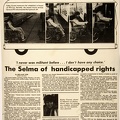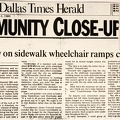Denver Post 2/16/85
PHOTO by Denver Post's Jim Pre[name cut off]: A uniformed policeman kneels beside a man in a wheelchair [George Roberts]. George has shades and an Afro and he is tilting his head to the side toward the policeman. The policeman is writing a ticket on his knee and George is telling him his information. Behind the two of them is another uniformed officer, visor on his cap shading his eyes, arms crossed across his chest and disapproving turn to his mouth. Behind him is a blurry crowd of people with their backs toward the camera.
Caption reads: Officer R.H. Kaspersen issues a ticket to George Roberts during blockade of metro buses.
Handicapped block buses
2 protesters are arrested; talks planned
By Judith Brimberg 2/16/85
Denver Post Staff Writer
For the second day in a row, wheelchair-bound protesters blocked an RTD bus in downtown Denver Friday. They were demonstrating against possible discontinuation of accessible bus service for the handicapped.
Despite efforts by the Peña administration to mediate the dispute, the protest went off as scheduled, and two handicapped demonstrators were arrested.
Denver police identified them as George Roberts, 36, and Renate Rabe, 30, who live in the same apartment complex at 1255 Galapago St. The pair, afflicted with cerebral palsy, were charged with impeding traffic and disobeying a lawful order. Rabe was released on her own recognizance, but Roberts, who participated in a similar demonstration several years ago, was held overnight in Denver County Jail.
Thursday, another member of the disabled-rights group known as ADAPT, Mike Auberger, 30, was arrested at East Colfax Avenue and Cherry Street for impeding traffic.
But efforts by Dale Saddler of the Mayor’s Commission on the Disabled ultimately paid off. Late Friday, both sides agreed to meet early next week to try to resolve the dispute. Demonstrations scheduled for this weekend were called off.
The handicapped community contended that RTD failed to understand that separate, private transportation for the handicapped doesn’t meet everyone’s needs, said Wade Blank, an able-bodied demonstrator who organized the protests.
On Tuesday, an RTD committee is to review policies affecting the elderly and the handicapped. Among the options to be considered are discontinuing accessible service on public buses and expanding handyride services or brokering services to private providers.
In an interview, Blank said he organized the protests because “the handicapped aren’t going to be the stepping stones to a new budget.”
More than two years ago, he and others obtained a commitment from RTD to install wheelchair lifts on 50 percent of the peak-hour buses.
But RTD, like other transportation districts across the country, is facing severe cuts in federal aid and Blank fears the agency may try to balance its budget at the expense of the handicapped. Many wheelchair lifts have proved unreliable and costly to repair.
Larry Perry, chairman pro tem of the RTD board, said Friday that Blank’s fears were groundless. “If they will sit down and talk with us, they will learn they won’t be hurt,” he declared.
Earlier this week, however, General Manager Ed Colby told board members it costs $72 a year to maintain bus lifts because 12,000 disabled persons ride the buses each year. It’s cheaper to maintain lifts on the handy vans, Colby said.
Blank countered that RTD is sabotaging its accessible program by refusing to perform inventive maintenance on the Colby’s handyride figures are distorted, he added, because they include the elderly as well as the disabled.
- Created on
- Thursday 11 July 2013
- Posted on
- Tuesday 10 May 2016
- Tags
- cost, George Roberts, jail, maintenance, Mayor Federico Pena, Mayor's Commission on the Disabled, Mike Auberger, police, privatization, Renate Rabe Conrad, RTD, separate and unequal, Wade Blank, wheelchair bound
- Albums
- Visits
- 2407
- Rating score
- no rate
- Rate this photo


0 comments